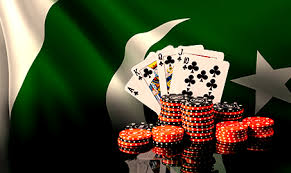
In Pakistan, gambling remains a highly controversial and legally restricted activity, with the law prohibiting most forms of betting. However, the increasing popularity of online gambling and slot machines is forcing authorities to reevaluate the landscape. With the rise of online casinos and digital platforms offering slot games, many are asking: Are online slots a better alternative for Pakistan’s gambling industry?
In this blog, we will explore the potential benefits and challenges of online slots as a solution to the country’s existing gambling dilemma, taking into consideration the shift from traditional, land-based gambling to the digital realm.
The Appeal of Online Slots
Online slot machines have gained a significant following worldwide, including in countries where gambling is heavily regulated or restricted. For many, the convenience of playing from home, combined with the variety and excitement offered by online platforms, makes online slots a highly attractive option. In the context of Pakistan, where access to physical casinos and slot machines is limited, online slots present a promising alternative.
1. Accessibility and Convenience
One of the primary benefits of online slots is their accessibility. Unlike traditional casinos, which require players to travel to a specific location, online slots can be accessed from virtually anywhere, as long as there is an internet connection. For many Pakistanis, this convenience allows them to enjoy their favorite games without the need for travel or the risk of exposure in illegal gambling venues.
Additionally, online slots can be played at any time of day or night, offering much more flexibility compared to physical casinos, which are usually limited by hours of operation. This accessibility makes online gambling a more convenient option for those looking to indulge in a gaming experience on their own terms.
2. Variety and Innovation
Online slots offer an incredible variety of games, far beyond what is available in traditional slot machines. Players can choose from a wide range of themes, game mechanics, and payout structures, with new games constantly being introduced. For many gamblers, this variety is a major draw. Whether it’s classic fruit machines or more innovative 3D slots, the possibilities are endless.
Furthermore, online platforms often provide advanced features such as bonus rounds, free spins, and progressive jackpots, which enhance the gaming experience. This innovation has revolutionized the slot machine industry, offering players a level of excitement and engagement that physical slot machines simply cannot match.
3. Safer and More Secure
With physical slot machines often operating in unregulated, underground settings in Pakistan, there are numerous risks involved, from fraud to addiction. Online platforms, however, can be regulated (depending on the legal environment) and can offer a higher level of consumer protection. Many online casinos are licensed and follow strict rules that ensure the fairness of the games and the security of transactions.
In a regulated environment, players can also access tools to control their gambling behavior, such as setting limits on their spending or self-excluding from platforms for a certain period. This level of control can help reduce the risks of gambling addiction and financial harm, making online slots a safer option for those who choose to engage in gambling activities.
The Challenges of Online Slots in Pakistan
While online slots present several benefits, there are also significant challenges to consider, particularly in the context of Pakistan’s legal and cultural landscape.
1. Legal and Regulatory Concerns
Despite the growing popularity of online gambling worldwide, Pakistan has strict laws against gambling, and most forms of betting are illegal. This makes online gambling a gray area in the country. While international online casinos may be accessible to Pakistani players, they operate without the oversight of local authorities, creating a space where players have limited legal protection.
The lack of regulation means that online gambling platforms can potentially exploit Pakistani players, offering unfair odds or not paying out winnings. In addition, the ease with which individuals can access online gambling sites raises concerns about minors or vulnerable individuals being exposed to gambling risks.
2. Risk of Addiction
While online gambling platforms offer the convenience of play at any time, this can also lead to negative consequences, particularly in terms of addiction. The accessibility and the nature of online slots—designed to be fast-paced and highly engaging—can lead to compulsive gambling behavior. Without the oversight of a regulated physical venue, players may lose track of time and money, potentially leading to financial ruin and personal problems.
Moreover, the anonymous nature of online gambling can make it harder for individuals to recognize when they have crossed the line into addiction. Unlike land-based casinos, which often provide a more social experience with face-to-face interactions, online gambling can isolate individuals, making it easier for them to ignore their behavior.
3. Lack of Consumer Protection
In Pakistan, the absence of clear regulations for online gambling means that there are fewer protections for consumers. Many online gambling platforms, particularly those that are unlicensed, may not adhere to fair play standards or secure financial transactions. Players may find themselves caught in fraudulent schemes or unable to withdraw their winnings.
To address these issues, there needs to be a clear regulatory framework in place that can protect consumers and ensure that online gambling operators adhere to strict standards of fairness and transparency. Until such regulations are implemented, players in Pakistan are at risk of exploitation.
Will Legalizing Online Slots Solve the Problem?
Legalizing online slots in Pakistan could have a significant impact on the country’s gambling industry. By regulating online casinos, the government could provide a safer and more secure environment for gamblers, while also generating tax revenue that could be used to fund addiction prevention programs and public health initiatives.
Legalization would also allow for better control over the industry, ensuring that platforms follow fair practices and offering the possibility of consumer protections. It could also reduce the prevalence of underground gambling activities and improve the integrity of the gambling experience for players.
However, the legalization of online slots would need to be carefully regulated. The government would have to ensure that there are sufficient safeguards to protect vulnerable players from addiction and ensure that gambling revenues are used responsibly. Only with a solid regulatory framework can online slots become a viable and beneficial alternative for Pakistan’s gambling industry.
Conclusion
Online slots are undoubtedly a more convenient and safer alternative to traditional slot machines, offering a wide variety of games and ensuring a more secure environment for players. For Pakistan, they represent a potential way to modernize and regulate its gambling industry. However, the challenges of legal uncertainty, addiction risks, and lack of consumer protection cannot be ignored.
If Pakistan were to legalize and regulate online slots, it could potentially address many of these issues and create a safer, more transparent gambling environment. However, careful consideration and robust regulation would be necessary to ensure that the benefits outweigh the risks. As the global gambling industry continues to evolve, Pakistan must find a way to balance the desire for entertainment with the need for protection and regulation.
🚀 KKClub.pk: The Best Casino & Slot App for Unmatched Gambling Fun in 2024 🎰
Looking for the best casino app in Pakistan? KKClub.pk is your ultimate destination for online gambling, offering a wide variety of live casino games, slots, and big jackpot wins all on your mobile. Whether you’re a fan of poker, blackjack, or spinning the reels on the latest slot machines, KKClub.pk has everything you need for an unforgettable gambling experience.
Why Choose KKClub.pk for Your Gambling Needs?
- Top Casino Games: Explore our live casino games including roulette, poker, blackjack, and baccarat. Experience the thrill of real-time casino action wherever you are!
- Massive Slots Collection: Dive into a wide range of slots with incredible themes, exciting bonus features, and huge payout opportunities. Whether you’re looking for classic slots or modern video slots, we’ve got you covered!
- High Payouts & Jackpots: At KKClub.pk, we feature some of the highest payout slots, giving you a greater chance to hit life-changing jackpots with every spin.
- Safe and Secure: Enjoy safe gambling with fast payouts and a secure gaming environment. Your privacy and security are our top priority, with 100% secure payment methods.
Exclusive Bonuses & Promotions at KKClub.pk
- Claim Your Welcome Bonus: New players can take advantage of our exclusive welcome bonuses when they sign up today. Get free spins, deposit bonuses, and more to boost your chances of winning.
- Ongoing Promotions: Don’t miss out on special promotions and loyalty rewards. The more you play, the more you win!
How to Get Started with KKClub.pk
- Download the KKClub.pk App: Available for both Android and iOS, get the app and start playing today.
- Sign Up & Get Your Bonus: Create your account and receive an instant welcome bonus to kickstart your journey with us.
- Start Playing & Win Big: Whether you prefer slots or casino games, we offer endless ways to win with the best payout rates in the industry.
Why KKClub.pk is the Best Online Casino App
- 24/7 Support: Our customer support team is here to assist you whenever you need help, ensuring you have a smooth experience every time you play.
- Mobile-Friendly: Play from anywhere, anytime, with our optimized mobile app for both Android and iOS. Just download it now and take your favorite games with you on the go.
🌟 Join KKClub.pk today and experience the best online casino and slots app in Pakistan! 🌟


